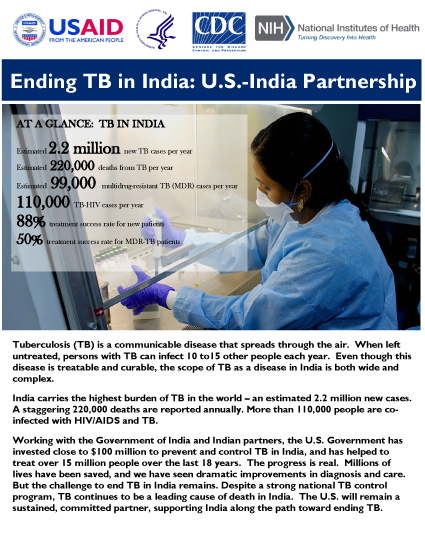AT A GLANCE: TB IN INDIA
Ending TB in India: U.S.-India Partnership ![]() (pdf - 345k)
(pdf - 345k)
Tuberculosis (TB) is a communicable disease that spreads through the air. When left untreated, persons with TB can infect 10 to15 other people each year. Even though this disease is treatable and curable, the scope of TB as a disease in India is both wide and complex.
India carries the highest burden of TB in the world – an estimated 2.2 million new cases. A staggering 220,000 deaths are reported annually. More than 110,000 people are co-infected with HIV/AIDS and TB.
Working with the Government of India and Indian partners, the U.S. Government has invested close to $100 million to prevent and control TB in India, and has helped to treat over 15 million people over the last 18 years. The progress is real. Millions of lives have been saved, and we have seen dramatic improvements in diagnosis and care. But the challenge to end TB in India remains. Despite a strong national TB control program, TB continues to be a leading cause of death in India. The U.S. will remain a sustained, committed partner, supporting India along the path toward ending TB.
United States Agency for International Development (USAID)
USAID is a strong partner that has worked with the Government of India since 1998. USAID is supporting the GOI’s Call to Action For a TB-Free India – a full-scale campaign to engage healthcare providers, corporate partners, media, celebrities, academia, and patients to end TB in India. This will be achieved by encouraging the adoption and implementation of best practices for the prevention, detection and treatment of TB as well as by raising awareness to reduce the social stigma associated with the disease and empowering communities. In addition, USAID will soon initiate the Tuberculosis Health Action Learning Initiative (THALI), a $22.5 million program that will complement the Revised National TB Control Program (RNTCP) by engaging municipal governments and private providers to prevent, test, and treat TB in select cities in India. The program will help urban slum communities by strengthening the capacity of private providers to follow international standards for TB care, diagnosis and treatment and by testing and scaling innovations that improve treatment adherence. For example, USAID is supporting the first national anti-TB drug resistance survey and the first large-scale pilot project to diagnose TB among people living with HIV.
Centers for Disease Control and Prevention (CDC)
The CDC is a committed partner working with the Government of India. It has provided technical assistance for TB control efforts since 1997. The CDC collaborates with the government, Indian institutions and international organizations in laboratory strengthening, airborne infection control, and multi-drug resistant (MDR-TB) diagnosis, treatment and support. The CDC supports the National Institute of Research in Tuberculosis to conduct whole genome sequencing to identify genetic markers of resistance, a critical step to developing improved tests to diagnose multidrug-resistant TB. The CDC has been conducting trainings, facility assessments and providing on-site support that has strengthened local capacity to improve airborne infection control and reduced healthcare-associated TB transmission in public health facilities since 2012. To expand on this work, the CDC will work closely with the GOI to develop national trainings for airborne infection control and improve infection control in HIV treatment centers. The CDC also supports counsellors to provide education and social support to MDR-TB patients to ensure treatment completion and cure. In addition, the CDC will work closely with India to develop national trainings for airborne infection control and improve airborne infection control in HIV treatment centers.
National Institutes of Health (NIH)
Over the past few decades, the NIH has developed a robust relationship with the Government of India and India’s medical research community to support biomedical and behavioural health research collaborations related to TB prevention and control. The NIH portfolio in India includes TB-related projects that aim to understand TB in the context of complex disease outcomes such as HIV-TB co-morbidity and multidrug-resistant TB, and investigate possible treatments and point-of-care diagnostics. In partnership with the National Institute of Allergy and Infectious Diseases (NIAID), the Office of AIDS Research/NIH, the Indian Department of Biotechnology and the Indian Council of Medical Research, the NIH has established RePORT India (Regional Prospective Observational Cohort). RePORT is a multinational collaborative effort designed to advance TB science in India. The consortium consists of five distinct TB cohorts in South India working in collaboration with U.S. universities to address a wide array of scientific objectives and to institute a common prospective observational research protocol that is supported by a central repository, a central data management center, utilization of harmonized data elements, and specimen collection standard operating protocols.








Comment
Make a general inquiry or suggest an improvement.